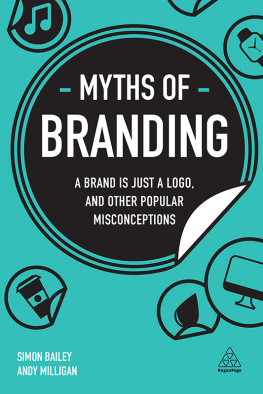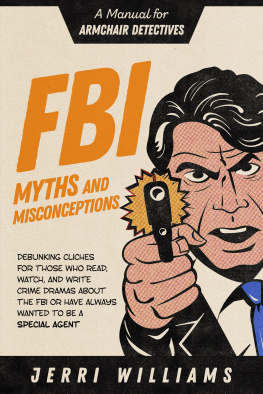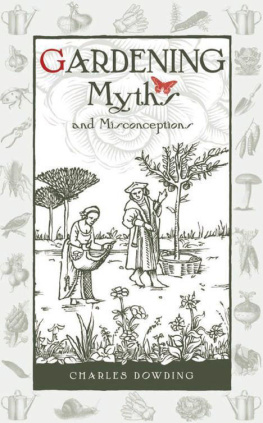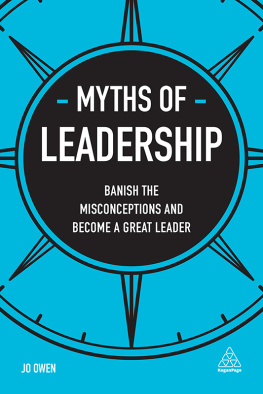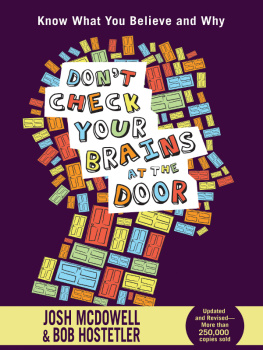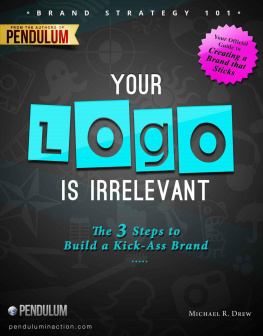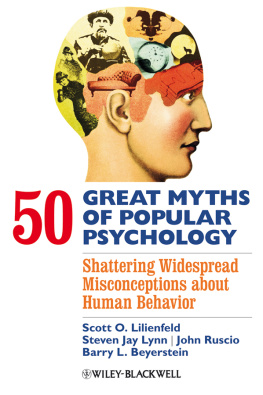Simon Bailey - Myths of Branding: A Brand is Just a Logo, and Other Popular Misconceptions (Business Myths)
Here you can read online Simon Bailey - Myths of Branding: A Brand is Just a Logo, and Other Popular Misconceptions (Business Myths) full text of the book (entire story) in english for free. Download pdf and epub, get meaning, cover and reviews about this ebook. year: 2018, publisher: Kogan Page, genre: Business. Description of the work, (preface) as well as reviews are available. Best literature library LitArk.com created for fans of good reading and offers a wide selection of genres:
Romance novel
Science fiction
Adventure
Detective
Science
History
Home and family
Prose
Art
Politics
Computer
Non-fiction
Religion
Business
Children
Humor
Choose a favorite category and find really read worthwhile books. Enjoy immersion in the world of imagination, feel the emotions of the characters or learn something new for yourself, make an fascinating discovery.
- Book:Myths of Branding: A Brand is Just a Logo, and Other Popular Misconceptions (Business Myths)
- Author:
- Publisher:Kogan Page
- Genre:
- Year:2018
- Rating:3 / 5
- Favourites:Add to favourites
- Your mark:
- 60
- 1
- 2
- 3
- 4
- 5
Myths of Branding: A Brand is Just a Logo, and Other Popular Misconceptions (Business Myths): summary, description and annotation
We offer to read an annotation, description, summary or preface (depends on what the author of the book "Myths of Branding: A Brand is Just a Logo, and Other Popular Misconceptions (Business Myths)" wrote himself). If you haven't found the necessary information about the book — write in the comments, we will try to find it.
Simon Bailey: author's other books
Who wrote Myths of Branding: A Brand is Just a Logo, and Other Popular Misconceptions (Business Myths)? Find out the surname, the name of the author of the book and a list of all author's works by series.
Myths of Branding: A Brand is Just a Logo, and Other Popular Misconceptions (Business Myths) — read online for free the complete book (whole text) full work
Below is the text of the book, divided by pages. System saving the place of the last page read, allows you to conveniently read the book "Myths of Branding: A Brand is Just a Logo, and Other Popular Misconceptions (Business Myths)" online for free, without having to search again every time where you left off. Put a bookmark, and you can go to the page where you finished reading at any time.
Font size:
Interval:
Bookmark:

A BRAND IS JUST A LOGO
AND OTHER POPULAR MISCONCEPTIONS
Simon Bailey
Andy Milligan

Publishers note
Every possible effort has been made to ensure that the information contained in this book is accurate at the time of going to press, and the publishers and authors cannot accept responsibility for any errors or omissions, however caused. No responsibility for loss or damage occasioned to any person acting, or refraining from action, as a result of the material in this publication can be accepted by the publisher or the authors.
First published in Great Britain and the United States in 2019 by Kogan Page Limited
Apart from any fair dealing for the purposes of research or private study, or criticism or review, as permitted under the Copyright, Designs and Patents Act 1988, this publication may only be reproduced, stored or transmitted, in any form or by any means, with the prior permission in writing of the publishers, or in the case of reprographic reproduction in accordance with the terms and licences issued by the CLA. Enquiries concerning reproduction outside these terms should be should be sent to the publishers at the undermentioned addresses:
2nd Floor, 45 Gee Street
London
EC1V 3RS
United Kingdom
c/o Martin P Hill Consulting
122 W 27th Street
New York, NY 10001
USA
4737/23 Ansari Road
Daryaganj
New Delhi 110002
India
Simon Bailey and Andy Milligan 2019
The right of Simon Bailey and Andy Milligan to be identified as the authors of this work has been asserted by them in accordance with the Copyright, Designs and Patents Act 1988.
ISBNs
Hardback 978 0 7494 9771 2
Paperback 978 0 7494 8309 8
Ebook 978 0 7494 8310 4
Typeset by Integra Software Services, Pondicherry
Print production managed by Jellyfish
Printed and bound in Great Britain by CPI Group (UK) Ltd, Croydon CR0 4YY
To Dad, KP and Caffeine.
Simply the best.
SIMON
Simon and Andy have known each other for over twenty years. Much of that time has been spent working around the world helping impatient business leaders deliver brand-led growth. Simon has led several well-known branding consultancies and Andy is co-founder of The Caffeine Partnership. Both appear regularly in the media, writing and commentating on brands. Andy has also published a number of other books on branding and delivering a branded customer experience, including Bold and On Purpose.
There are many books on branding and there are many theories and approaches to the subject of branding. In the end, though, most of these are essentially the same and all come to similar conclusions about the importance of branding and the key principles that underpin successful brands. All agree that brands are important assets for businesses, that consumers value them, and that underpinning them are essential rules of consistency, clarity, relevance and differentiation.
However, despite the fact that there is so much agreement on the value and the meaning of brands, there are still many myths that abide about the precise role, nature and worth of brands. Probably these myths persist for two reasons. One is that, although the discipline of branding is well established, it is not such a formalized practice nor an integral legal part of corporate governance that its rules and standards have been set down, agreed upon and instituted in regulatory bodies around the world. So there is an understandable degree of variation about the way in which branding is interpreted and practised. Two, the nature of branding compared to, say, accounting and law, is such that it is highly visible and ubiquitous in the lives of all of us. We are all exposed to brands and branding on a daily basis. We consume them, we reject them, and we admire them according to our personal attitudes and daily experiences. This means that almost everyone in the world has an opinion about brands and branding. And some of these opinions are shaped by a few voices in the media who worry about the insidious effect of consumerism upon our society and about the role of profiteering corporations in our world. Some people see brands as the poster child for an exploitative capitalist economy. Naomi Klein probably delivers the best-known articulation of that view.
We, the authors of this book, have spent all of our working lives in the field of brands and branding. We have seen brands that are good, brands that are bad and brands that are largely indifferent and unremarkable. We have always believed that brands are valuable. Developed and managed properly, they are an economic and social good. They help businesses grow, thus stimulating wealth creation, employment and taxation. And they help people get more quickly the things that they want, value and often need, be it cars or computers, milk or a mortgage, travel or telecommunications. Conversely, it is easier to punish a business by rejecting a brand which fails to perform a useful service or is associated with and owned by a company whose practices are either antisocial or in other ways unethical. Such consumer power can drive changes in corporate practices and thus improvements in the world in which we live. The growing consumer demand for Fairtrade branded products or environmentally sensitive production and packaging processes is evidence of this.
So this book is written from the perspective of many years of experience working with brands and brand owners all around the world and in different sectors. It is written from a place of positive appreciation of what brands can help companies and consumers achieve. Finally, of course, it is written from the perspective of ourselves as consumers of brands, just like everyone else.
Myths of Branding will seek to challenge some received wisdom and also bring the practice of branding up to date. We will seek to debunk some well-established myths that branding is just about identity, that brands dont have any real value, that brands exist just to drive premium pricing but we will also look at how technology is really impacting brands, whether brand loyalty really is being diminished, the extent to which the customer is always right, what happens if you lose trust. We will also look at some of the myths that surround the practitioner, for example that brands dont matter in business, that there are no real tools to help you manage your brand, that customers want a conversation with your brand. We will also explore other myths, but hopefully this will give you a feel for what is to come.
This book represents our informed and expert opinions. Nevertheless, they are just that our opinions. Others may disagree with the conclusions we draw about the myths that we have listed in this book. Others may feel that we have ignored some myths. We would be delighted to hear from anyone who takes a different view to us or thinks there are other myths that need to be challenged or can be proven.
In the end brands are built fundamentally on personal opinion, the opinion of one person deciding that they prefer or like one brand more than another. So it is only right that we encourage people to share and express their opinions on what we think.
Font size:
Interval:
Bookmark:
Similar books «Myths of Branding: A Brand is Just a Logo, and Other Popular Misconceptions (Business Myths)»
Look at similar books to Myths of Branding: A Brand is Just a Logo, and Other Popular Misconceptions (Business Myths). We have selected literature similar in name and meaning in the hope of providing readers with more options to find new, interesting, not yet read works.
Discussion, reviews of the book Myths of Branding: A Brand is Just a Logo, and Other Popular Misconceptions (Business Myths) and just readers' own opinions. Leave your comments, write what you think about the work, its meaning or the main characters. Specify what exactly you liked and what you didn't like, and why you think so.

